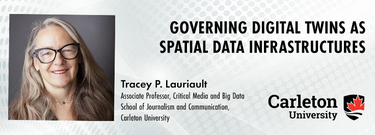Governing Digital Twins as Spatial Data Infrastructures

Tag:
Geospatial Leadership and AI
What:
Talk
When:
10:00 AM, Wednesday 15 May 2024
(30 minutes)
Where:
Ottawa Conference and Event Centre
- Geospatial Leadership & AI
How:
The Carleton University Immersive Media Studio (CIMS) was awarded a New Frontiers in Research Fund (NFRF) Exploration program grant to Imagine Canada’s Digital Twin. One aspect of the project is data governance and business models. In addition, the I Trust AI research SSHRC funded project based out of UBC, is examining the CIMS and city of Ottawa Digital Twins to assess how their creators might include preservation in their design. These research projects revealed that the Architecture, Engineering, Construction, and Owner Operators (AECOO) sectors involved in building digital twins in Canada lean towards proprietary platforms, are technologically enthusiastic about their potential and solutionist in their orientation - they will solve the world's most complex climate change problems. A closer examination of digital twins however shows that these are not yet interoperable, standardized and debates between open and proprietary platforms remain and there is little discussion about open data, data sharing and crowdsourcing. Furthermore, contemporary digital twins involve numerous data, software and hardware owners, myriad contracts with BIM vendors and sensor management and data analytics companies, as well as a skills, knowledge and technology divide between digital twin creators and those who build on constructions sites, building permit offices and the people that manage facilities and plants. These divides often results in shortcomings in procurement contracts that favour the private sector company instead of the asset owners. Finally, scholarly, gray and vendor literature do not discuss the potential for digital twins becoming one of the greatest surveillance apparati we have ever seen, should public engagement be offered, will the immersive environment be safe, group and individual privacy, and intellectual property and data sharing protocols are barely discussed nor is cybersecurity? Digital twins have much potential, but we ought not forget the issues around Sidewalk Labs in Toronto, and the excellent governance work of spatial data infrastructures (SDIs) at local, national, regional, global and planetary scales and the ideals of open smart cities.
It is argued here that digital twins are fledgling SDIs, experiencing the same growing pains SDIs did in the early 2000s. The AECOO sector can benefit from the knowledge of these established and well governed complex sociotechnological systems and that it is the responsibility of the geospatial community involved to remind ourselves of the policies, practices, legalities, standards, institutions and organizations, interoperability, models such as federated or centralized SDIs; most notably GEOSS and the Arctic Spatial Data Infrastructure (ASDI) which build in community, an understanding of the digital divide and Indigenous knowledge and data sovereignty.
Without consideration for governance - data & technical, digital strategies, public policy and legalities, and public engagement, digitals twins risk gaining the same negative public attention as smart cities and the Sidewalk Labs Quayside Toronto Project did, including META. There is much public good that can be derived from digital twins, especially if those involved in their creation, become more public facing and engage the public and governors in their creation and use, build them as and incorporate them into existing spatial data infrastructures, and conceptualize them as shared public spaces where we can imagine, plan and model the future together. Since digital twin will become an infrastructure of infrastrucutes, and like all infrastructures, ought we not build them now as public goods for mutual wellbeing and benefit?
It is argued here that digital twins are fledgling SDIs, experiencing the same growing pains SDIs did in the early 2000s. The AECOO sector can benefit from the knowledge of these established and well governed complex sociotechnological systems and that it is the responsibility of the geospatial community involved to remind ourselves of the policies, practices, legalities, standards, institutions and organizations, interoperability, models such as federated or centralized SDIs; most notably GEOSS and the Arctic Spatial Data Infrastructure (ASDI) which build in community, an understanding of the digital divide and Indigenous knowledge and data sovereignty.
Without consideration for governance - data & technical, digital strategies, public policy and legalities, and public engagement, digitals twins risk gaining the same negative public attention as smart cities and the Sidewalk Labs Quayside Toronto Project did, including META. There is much public good that can be derived from digital twins, especially if those involved in their creation, become more public facing and engage the public and governors in their creation and use, build them as and incorporate them into existing spatial data infrastructures, and conceptualize them as shared public spaces where we can imagine, plan and model the future together. Since digital twin will become an infrastructure of infrastrucutes, and like all infrastructures, ought we not build them now as public goods for mutual wellbeing and benefit?
For more information please visit the OCRCID website.
